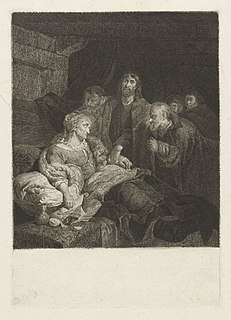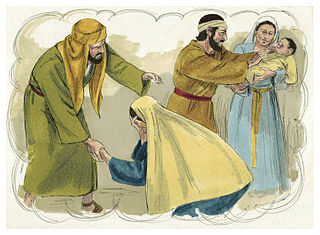Pseudo-Chrysostom: This centurion was the first-fruits of the Gentiles, and in comparison of his faith, all the faith of the Jews was unbelief; he neither heard Christ teaching, nor saw the leper when he was cleansed, but from hearing only that he had been healed, he believed more than he heard; and so he mystically typified the Gentiles that should come, who had neither read the Law nor the Prophets concerning Christ, nor had seen Christ Himself work His miracles. He came to Him and besought Him, saying, Lord, my servant lieth at home sick of the palsy, and is grievously afflicted. Mark the goodness of the centurion, who for the health of his servant was in so great haste and anxiety, as though by his death he should suffer loss, not of money, but of his well-being. For he reckoned no difference between the servant and the master; their place in this world may be different, but their nature is one. Mark also his faith, in that he said not, Come and heal him, because that Christ who stood there was present in every place; and his wisdom, in that he said not, Heal him here on this spot, for he knew that He was mighty to do, wise to understand, and merciful to hearken, therefore he did but declare the sickness, leaving it to the Lord, by His merciful power to heal. And he is grievously afflicted; this shows how he loved him, for when any that we love is pained or tormented, though it be but slightly, yet we think him more afflicted than he really is.
Rabanus Maurus: All these things he recounts with grief, that he is sick, that it is with palsy; that he is grievously afflicted therewith, the more to show the sorrow of his own heart, and to move the Lord to have mercy. In like manner ought all to feel for their servants, and to take thought for them.
Chrysostom: But some say that he says these things in excuse of himself, as reasons why he did not bring the sick man himself. For it was impossible to bring one in a palsy, in great torment, and at the point to die. But I rather think it a mark of his great faith; inasmuch as he knew that a word alone was enough to restore the sick man, he deemed it superfluous to bring him.
Hilary of Poitiers: Spiritually interpreted, the Gentiles are the sick in this world, and afflicted with the diseases of sin, all their limbs being altogether unnerved, and unfit for their duties of standing and walking. The sacrament of their salvation is fulfilled in this centurion's servant, of whom it is sufficiently declared that he was the head of the Gentiles that should believe. What sort of head this is, the song of Moses in Deuteronomy teaches, He set the bounds of the people according to the number of the Angels. (Deut. 32:8.)
Saint Remigius: Or, in the centurion are figured those of the Gentiles who first believed, and were perfect in virtue. For a centurion is one who commands a hundred soldiers; and a hundred is a perfect number. Rightly, therefore, the centurion prays for his servant, because the first-fruits of the Gentiles prayed to God for the salvation of the whole Gentile world.













